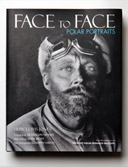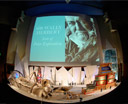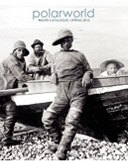 Our ProductsOur Resources |
This website requires the free Flash plugin to be installed.
Polarworld - discover more polar booksThe Arctic Book Review
Robert Ruby Reviewed by Russell A. Potter In December of 1858, a Cincinnati engraver and sometime newspaper publisher by the name of Charles Francis Hall took a brief stroll from his shop on West Fourth Street. A few doors down, at Smith and Nixon's Hall, the printed bills in the window advertised the appearance of a "moving panorama" of the Arctic Regions. Judging from a notice Hall published in his Cincinnati Occasional, the narrator of the panorama had a hard time being heard over the crowds of schoolchildren in attendance; while praising the panorama, Hall decried the noise: "For the credit of children of Cincinnati, all shouts and noise, during their attendance, should cease." Yet despite the disruptions, Hall was apparently very deeply impressed as the "perilous adventures, wonderful discoveries, and singular phenomena witnessed by Dr. Kane and his brave companions" in the "frozen regions" scrolled before his view. Within six months, the hitherto quite settled Mr. Hall began making preparations to sell his business and equip an expedition of his own to the Arctic, the first of three such voyages which would encompass more than a decade, establishing Hall as the leading American polar explorer of his day. Nearly three hundred years before Hall, in the reign of Elizabeth I, a pirate-adventurer by the name of Martin Frobisher set sail for Cathay by means of the fabled North-west Passage, passing Greenland (mis-marked on his charts as the fabled island of Frisland) and coming unexpectedly upon a hitherto undiscovered country, its waters dotted with icebergs, and its gravelly soil streaked with veins of weighty black stone. Robert Garrard, one of the sailors aboard Frobisher's ship the Gabriel, idly picked up a piece of the black stone, and pocketed it as a souvenir. The stone returned to England, where its glittering surface piqued the curiosity of many a courtier -- might it contain gold? Martin Frobisher would find out, and with the backing of private investors and the Queen's Privy Council, returned in force equipped to mine the black stone in great quantities, and establish her Majesty's first settlement in the New World, in a land the Queen dubbed "Meta Incognita" -- the "unknown shore." By 1860, no one knew just where Frobisher had landed, and his failed colony, planned years before Roanoke and Jamestown, was little more than a historical footnote, a rumor, a myth. The story of how Charles Francis Hall, carried north by a friendly whaler and guided by local Inuit, discovered the traces of the mines and outbuildings of Frobisher's establishment, and reconstructed its history from the still-living oral traditions, is the tale at the heart of Robert Ruby's immensely gripping new book. Ruby, a writer as comfortable among old ledgers covered with the peculiar Elizabethan scrawl known as "secretary hand" as among the tattered notebooks in which the ever-enthusiastic Hall recorded his Arctic effusions (FOURTEEN DAYS IN AN IGLOO!!), has done an astonishing job of reconstructing the histories of both discoverer and discovered, producing an interlinked narrative that ranks among the most compelling accounts of Arctic exploration ever written. Too often, the explorer is seen as a lone figure, silent and meditative, indifferent to landscape and indigenous peoples alike, refusing to yield in the face of odds that would freeze the souls of ordinary men. This popular notion of the altruistic explorer-hero, exemplified by the recent frenzy over the exploits of Sir Ernest Shackleton, is wonderful to behold -- but in the end, as false today as it was then. What the late Canadian poet Gwendolyn MacEwen has called the "complex, crushed geography" of the adventurous spirit is as riven with darker motives and stranger dreams as Frobisher's "Countesse of Warwicke Island" was seamed by dark and glittering ore. Frobisher, on the face of it the more mercenary of the two figures Ruby so ably sketches, managed despite the eventual failure of his Arctic enterprise to embody both the spirit and the method which would guide the next century of English settlements. Hall, ostensibly a self-abnegating missionary called by God to search for traces of the lost Franklin expedition, displayed at times a brute egotism which endangered the lives of those he believed would hinder him, and cost him the friendship of many who would otherwise have aided him. Yet in the end, both emerge as men drawn forward by a strange, almost uncanny attraction to the unknown, and to the extraction of gold and knowledge from the seemingly unyielding ice and stone. These were quests which could not be accomplished alone. Both Frobisher and Hall needed backers, people who would register their votes of confidence with pounds, shillings, and pence (or dollars and cents), and both needed the services of navigators and pilots more skilled at traversing unfamiliar seas than themselves. Even once they arrived at their icy destinations, they remained dependent -- more so than either wished to acknowledge -- on the Inuit, whose knowledge of the land was a prerequisite for survival. Frobisher, a man of his times, preferred either to buy the Inuit off with gifts, or compel them with violence, or both -- he took an Inuk prisoner on his first expedition, and captured an entire family on his second, all of whom sickened and died within a few months of their arrival among England's invisible fauna of unfamiliar bacteria. Hall, though outwardly the friend and champion of the Inuit, was almost as demanding as Frobisher, though he was obliged to cajole rather than compel. His search for traces of Frobisher on "Kodlunarn Island" was facilitated by a payment of nine boxes of percussion caps, a payment made to Inuit who were wary of wasting time in such a desolate place when the season and the weather augured against it. Hall, too, in need of means to finance his second Arctic expedition, resorted to hiring out his Inuit guides, Ebierbing and Tookoolito, to Barnum's American Museum as living exhibits, then taking them on a lecture tour of the eastern seaboard which may have contributed to the death of Tookoolito's young child. Ruby, an editor at the Baltimore Sun newspaper, alternates his account of Frobisher's voyage with that of Hall's discovery of Frobisher's ruins, weaving them deftly into a continuous fabric of Arctic exploration and exploitation. Here and there, he adds a few anecdotes of his own sojourn among these fabled islands, located now a short journey from Iqaluit, the administrative capital of the newly-formed Canadian territory of Nunavut. Guided by the descendants of some of the same Inuit hunters who guided Hall, Ruby too enjoyed traditional meals of raw seal meat in a hunting camp a stone's throw from Frobisher's mines. In a wonderful moment of (post)colonial miscognition, Ruby is "recognized" by one of the hunters as a man whom he has seen long ago on television -- on belated translation from Inuktitut, the man turns out to be "Curly" of the Three Stooges. As he rides along on a snowmobile which hauls both gasoline and a few trusted dogs, Ruby sees in "Meeka," an Inuk woman equally at home with traditional and twentieth-century ways, much of the same knowledge by which Hall was guided a century and a half before. The book's journey, like Meeka's across the ice of Frobisher bay, has a few bumps here and there. Sometimes, as with the portrait of Elizabeth and her courtiers, there seems to be almost too much in the eway of historical background; at other moments, the pace is brisk and the reader passes fascinating landmarks without really having a chance to examine them. Nonetheless, readers who trust in Ruby's narrative instincts -- even those, such as this reviewer, who had thought they passed this way before -- will find surprises around each drift of the snow. There is a strange poignancy to Ruby's narrative, a lyricism which potently invokes that admixture of danger and beauty which Chauncey Loomis has called the "Arctic Sublime." Here in the twenty-first century, the whole globe mapped and traversed under one flag or another, it is odd to consider that the Arctic still signifies a perilous blank. What might we find there? And why are the armchair explorers of today drawn so frequently to the same destination which exerted its pull upon their great-great-grandparents, in a day in which there really were regions of the world where all maps failed? Ruby does not answer this question, but he moves adroitly among the bergs, guiding us through the seeming blindness of our own forgetfulness, back to a land and a time when there really was an unknown shore. |
|
||
follow us  | join us | join us  | home | contact | home | contact
|
||||
|
© Copyright Polarworld Ltd
SiteWizard.co.uk Web Site Design Company |
||||



 Unknown Shore: The Lost History of England's Arctic Colony
Unknown Shore: The Lost History of England's Arctic Colony